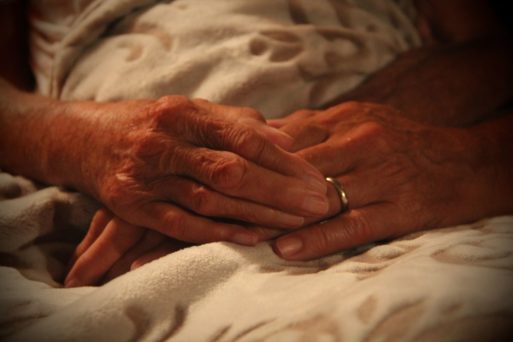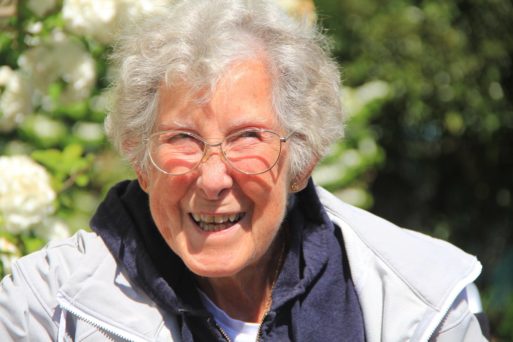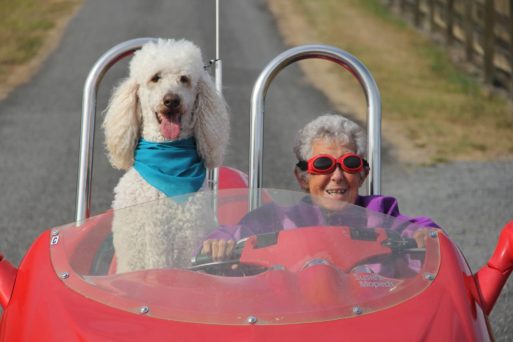Each month Kathleen Clohessy, R.N., offers a new perspective on living with a terminal illness. Kathleen comes to SevenPonds with 25 years experience as a registered nurse caring for families and children facing life-threatening illness. She began her career in the Pediatric Intensive Care Unit at Nassau County Medical Center in New York, and after relocating to California, spent 15 years as an R.N. and Assistant Nurse Manager at the Pediatric Oncology & Bone Marrow Transplant Unit at Lucille Salter Packard Children’s Hospital at Stanford. She uses her extensive personal knowledge and expertise to enlighten our readers regarding the challenges associated with chronic illness and their profound effects on family relationships and human dynamics.

Credit: facebook.com/DrivingMissNorma
Yesterday I read that Norma Jean Bauerschmidt, the 91-year-old woman who gained social media fame when she took to Facebook to share the last year of her life, had died. Norma was diagnosed with uterine cancer in 2015, just two weeks before her husband of 67 years passed away. Urged by her doctor to undergo surgery and chemotherapy immediately, the then 90-year old woman from Michigan instead set off on trip around the United States with her son Tim, his wife Ramie, and their dog, a standard poodle named Ringo. The Facebook page on which she shared her adventures, Driving Miss Norma, accumulated nearly 500,000 “likes” by the time she died on September 30, 2016.
Norma’s story touched the hearts of millions of people all over the world, some of whom are almost certainly facing a cancer diagnosis themselves. For many, it served as an inspiration: a tale of how the indomitable human spirit can not only endure in the face of adversity, but thrive. But for others, (and certainly for me) it provoked some serious soul-searching.
“What would I do if I were in Norma’s shoes?” I asked myself. Would I have the courage to look death in the face and greet it — if not with a smile, at least with an open and accepting heart? Would I listen to the doctors and take a chance that their surgery and chemotherapy could extend my life? How would I make such a monumental decision? Would I even realize that the choice was mine to make?

Credit: facebook.com/DrivingMissNorma
Obviously I can’t answer those questions with any degree of certainty, because I am not (at least not for the moment) in Norma’s shoes. But for those who have been given a diagnosis of cancer or other serious illness, they are of paramount importance.
How do you decide?
Which brings me to the the notion of a “good death.” These days, as the Baby Boomer generation ages and more and more of us are being diagnosed with diseases that medical science can treat but not cure, discussions of mortality are becoming far more commonplace. We all know we are going to die. The cloak of invincibility that we wore throughout our youth is gone, replaced by the knowledge of how terribly fragile life can be.
The good news here is that this knowledge has spurred conversations about how we want to approach our deaths, which is a very positive thing. We are making plans… talking about our funerals… drafting last letters to our families and friends. But what we haven’t done enough of, at least not in my experience, is thinking about how we want to live until we die.
Death is a moment. Dying is what we do between now and then.

Credit: facebook.com/DrivingMissNorma
Norma’s experience can offer us some very helpful insights. But in the end, we are not here to live someone else’s story or to follow someone else’s path. In fact, the most important message we can glean from Norma’s last days, I believe, is the fact that, no matter what happens in our lives, we always have a choice.
We are not compelled to follow “doctors orders.” We are not compelled to be carried along with the tide. The decision about how we are going to live out our days need not be — in fact mustn’t be — made by some impartial third party in a white coat. Instead, it should be informed by our personal values, goals, and, yes, even our dreams.
What matters most to you?
What do you want to accomplish before time runs out?
What stories have you not yet shared? What forgiveness have you not offered? What words have you left unsaid?
Figure out the answers to these questions, and you will be well on your way to a beautiful rest of your life.
You don’t have to take off on an adventure across the country for the journey to be worthwhile.

 Bowing Out Gracefully
Bowing Out Gracefully



 Composting Bodies Is Now Legal in a Dozen States
Composting Bodies Is Now Legal in a Dozen States
 “Hand to Earth” by Andy Goldsworthy
“Hand to Earth” by Andy Goldsworthy














